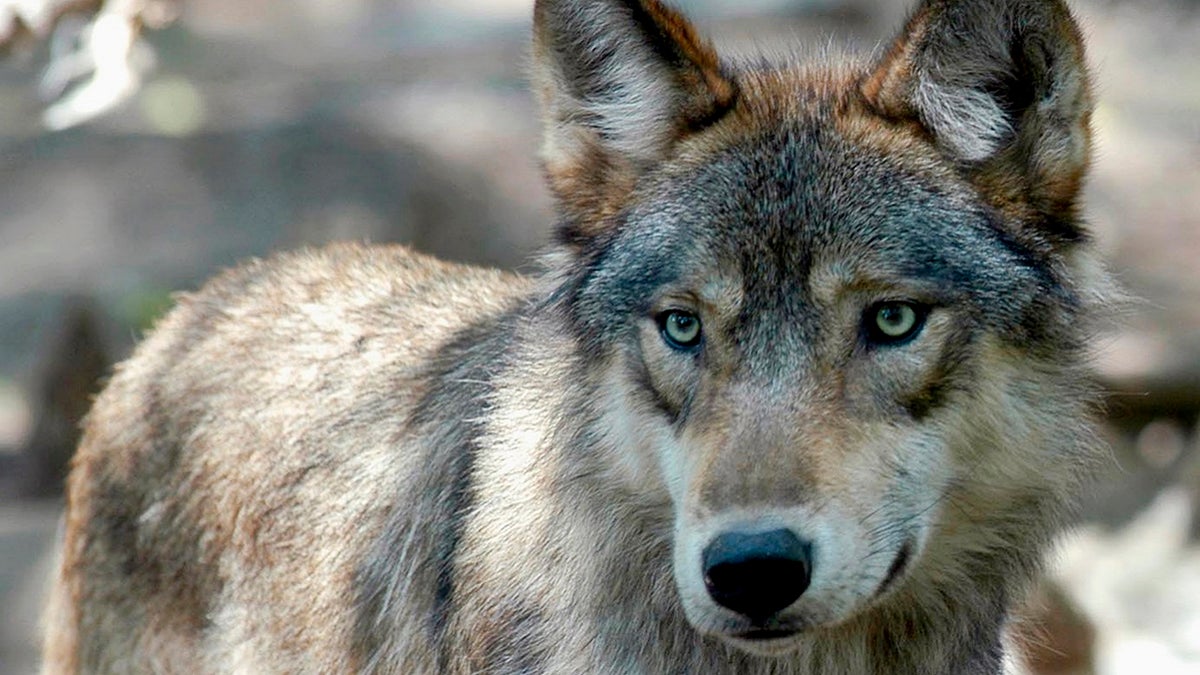Fox News Flash top headlines for August 11
Fox News Flash top headlines are here. Check out what's clicking on Foxnews.com.
Wildlife officials in Wisconsin meet Wednesday to consider a 130-animal limit for the state's fall wolf hunt, saying they want to protect the population after hunters killed almost twice as many wolves as allotted during a rushed spring season.
The state Department of Natural Resources' policy board was scheduled to take up the proposal in Milwaukee, with the vote certain to be contentious.
Wolves have always been a touchy subject in Wisconsin. Farmers and residents across northern Wisconsin contend wolves menace their pets and livestock and hunting is the only way to control them. Conservationists counter that the population is too small to sustain hunting. The fight grew even more intense after hunters this spring killed 218 wolves in four days, blowing past a 119-animal limit before the DNR could shut the season down.

A gray wolf at the Wildlife Science Center in Forest Lake, Minn., in 2004. Wildlife officials in Wisconsin were set Wednesday to consider adopting a 130-animal limit for the state's fall wolf hunt, saying they want to protect the population after hunters killed scores more wolves than they were allowed during a rushed spring season. (AP)
UNIVERSITY OF WISCONSIN-MADISON REMOVES MASSIVE ROCK FROM CAMPUS AFTER 'RACISM' CLAIMS
Nearly 60 people have registered to speak at Wednesday's meeting, including the president of the Lac du Flambeau Band of Lake Superior Chippewa — the Chippewa consider the wolf sacred — and representatives from the Sierra Club and the Humane Society of the United States. The pro-hunting side has lined up members of hunter advocacy group Hunter Nation, the Wisconsin Farm Bureau Federation, the Wisconsin Alliance of Sporting Dogs and the Wisconsin Bear Hunters Association.
Wisconsin law requires the DNR to hold a wolf hunt every year between November and February. The state held three seasons before a federal judge restored them to the endangered species list in late 2014, halting the practice. The Trump administration removed wolves from the list in January 2021, forcing the DNR to reinstate a hunt.
The DNR was planning a November season but Hunter Nation won a court order in mid-February forcing the department to hold a season that month. The group argued that President Biden's administration might put wolves back on the endangered species list before fall, robbing hunters of the chance to go after the animals.
After the DNR scrambled to put the season together, hunters took to the woods, most using dogs to track the wolves and aided by fresh snow that made tracking easier. A state law requiring 24 hours notice before the season was closed, along with the issuance of twice as many permits as usual, contributed to blowing past the quota.
WISCONSIN GOVERNOR VETOES GOP BILLS TO RESTRICT ABSENTEE BALLOTS
DNR officials said the 130-animal recommendation for the fall hunt is based on consulting with an advisory committee of local government officials, nongovernmental organizations, tribes and conservation groups. The department concluded that the impact of the February hunt is still unclear and a quota of 135-140 animals probably wouldn’t result in a overall population reduction.
The DNR's most recent estimate of wolves in Wisconsin, during the winter of 2019-20, put the population at about 1,000. The department's goal is 350 wolves statewide. But conservationists maintain the February hunt was devastating to the state's wolf population since it was held during the animal's mating season. A University of Wisconsin study released last month also estimated another 100 wolves were killed by poachers after the animals lost their endangered species protection.
Adrian Treves, a UW-Madison carnivore researcher who helped put the study together, told the agency in submitted testimony that it would be "reckless" to authorize a November hunt without gathering more data about the full impact of the February season. He warned that a 130-animal quota could push the state's wolf population to fewer than 350 animals.
CLICK HERE TO GET THE FOX NEWS APP
No one responded to an email left in Hunter Nation's general inbox Tuesday. Carl Schoettel, president of the Wisconsin Bear Hunters Association, argued in written remarks to the board that it should set the quota at 420 wolves, insisting that the DNR is underestimating the size of the wolf population and harvesting up to 30% of the population will result in no reduction.
"We ask you, members of the Natural Resources Board, to listen to science, to listen to the people of northern Wisconsin, to listen to the elected county officials of the region, to listen to Wisconsin's farmers, and to listen to the Wisconsin sportsmen and women who actually encounter and deal with wolves in pursuit of their sporting heritage," Schoettel wrote.


